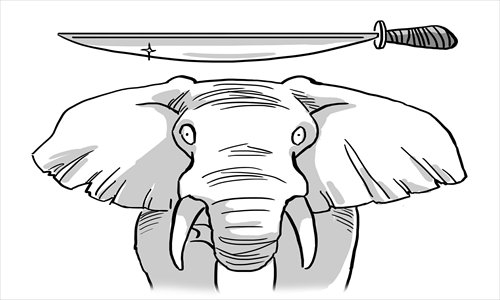Blind eye to poaching endangers Africa

Nairobi hosted two celebrities from China recently, about a month after Chinese President Xi Jinping toured Africa.
Chinese actress Li Bingbing and former NBA star Yao Ming were on a trip to Kenya that sought to raise awareness about the illicit wildlife trade. Li linked the vice to global criminal rings.
The UN says the number of elephants killed in Africa has doubled in a decade. Rhino poaching rates have similarly escalated by more than 1,000 percent in the same period. In southern Africa, an average of 500 rhinos are killed annually.
Poaching is turning out to be a serious threat to the stability and growth of Africa. It is already depriving the impoverished continent of its precious resources while at the same time undermining the rule of law.
Permeable borders, weak judicial systems, corruption and lucrative and ready markets have aggravated poaching, with security operatives potentially outgunned in the battle against the technology-competent gangs.
Like drug traffickers, the criminals operate across the borders, have strong financial backing, and are well armed. Any barrier standing on the way ordinarily faces their wrath.
Underneath this grievous business lies China and Thailand, the focal markets in Asia for wildlife products. At a recent Convention on International Trade in Endangered Species, Bangkok promised to tighten its laws that have allowed poachers to ship tusks from Africa to Thailand, making it the second-biggest market for illegal elephant tusks in the world.
The declaration appeared to have put some pressure on China to stop its legal ivory trade, a sector that has helped catalyze the unprecedented poaching levels of the African wildlife.
The celebrities' tour gestured China's commitment to supporting the world in curbing the illegal trade that has tainted its image internationally.
But that may neither be enough nor sustainable. There is a difficult task ahead, which China inevitably has to deal with otherwise the outcome might be detrimental.
Some countries are already proposing to impose trade sanctions and embargoes on China until it comes up with an adequate plan to fight the menace.
Back in Africa, there are growing sentiments against Chinese investments due to what is seen is its reluctance to check poaching.
Based on the rate, complexity and scale of poaching, China needs to take serious measures.
In partnership with other affected nations, Beijing should engage in high-tech techniques like those used to combat prohibited business in narcotics such as undercover operations.
It could also make use of controlled delivery plans where the wildlife products are not just seized but also traced to their destination.
This will diminish the lure of the trade, as the architects will easily be recognized and punished.
This calls for truly punitive penalties too. The enforcement measures taken in Africa and China today against poaching are so lenient that they cannot deter the practice.
A recent story where a suspected poacher was released on a $250 bond by a Kenyan court was undeniably seen as a slap in the face of conservationists.
It will be more meaningful if the judiciaries of the affected countries could deny bail to suspected poachers.
Such an enforcement model would need to be backed up by comprehensive and well coordinated measures, and driven by public awareness.
Possibly the long-lasting plan in handling this crisis would be to adopt the idea Namibia has employed in tackling the senseless killings of wildlife.
For about three decades, this southern African nation endured multiple cases of poaching that threatened to destroy its prized foreign exchange earner.
Through wildlife conservationists, the country encouraged community-based protection of wildlife.
Villagers were encouraged to see the wildlife as part of their families, just like their livestock.
They were made to appreciate that the conservation of the wildlife could attract tourists and create employment for their children.
The outcome has been incredible. Although there were only 300 black rhinos left in the 1980s, the population now stands at over 1,700.
The number of desert elephants, a rare species that survives in arid regions, has also gone up by over 400 percent to 600.
China, Thailand and Africa holding hands to fight the scourge is likely to inflict pain on poaching. But a truly global approach would absolutely kill the destructive trade.
The author is a journalist on African issues based in Nairobi, Kenya. mkapchanga@gmail.com